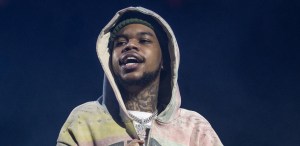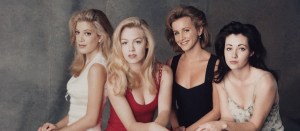The highly anticipated Donna Summer documentary is here. Released on HBO and produced by her daughter, actress Brooklyn Sudano, the two-hour film delivers never-before-seen home video footage and interviews with friends, and family. Archival footage with colleagues of Summer is also featured, and Summer tells her own story throughout. Her music takes her from the avant-garde scene in Germany to the glitter and bright lights of dance clubs in New York. outside of her career, the film highlights her yearning for privacy, and her motherhood journey. Toxic relationships and how they play a part in her life are also a focus. PopCulture.com spoke with Sudano about her seven-year trek to bring the documentary to life, other legacy projects, and showcasing her mother’s artistry and personal life in the project.
PC: This is a beautiful love letter to your mother. When did this entire project start? Because I know that there have been talks about a documentary or a biopic for at least a decade. But for you, when did you decide, ‘Okay, this is the route we’re going to take.’
Videos by PopCulture.com
BS: I think the inception of the idea, me going actually to my father first, and saying, “Hey, I think I’d like to spearhead a doc on Mom. How do you feel about it?” That was about seven-ish years ago, to be honest. I had had my daughter, my first child, and didn’t have my mom. I was a working mom at the same time. I started working when my daughter was like six months old and I shot my first film back. And I really was just like, “I think I need to peel back some of these layers. I want to understand some things. And he was like, “Yeah, go for it.”
It took a little bit of time to find the right team to really research and reach out to different people from the whole period of her life. But that was really the beginning. And then obviously, about three and a half, four years ago, Roger [director] and I met and sat down. And when I met with him, it was like, “Okay. This is it.” We are off to the races because we just had just a clear vision that we both shared and it was the same. And so I think we both felt comfortable moving forward together.
PC: Well, the final project is amazing. So I love the fact that the docuseries really captures how her fame happened unexpectedly due to the song “Love To Love You” being basically an accident, I guess you can say, and how it basically, I guess, shot from there. Because she was the queen from that moment on. And then from there, it really showcased her struggle of balancing her personal and private life. Why was it important for you guys to really start there?
BS:Well, I think we thought that was what “Love To Love You” is what launched her. She had some minor hits in Europe prior to that, but that’s what really launched her stardom. I think it also cemented this persona of the First Lady of Love and the Sex Goddess and all of these titles. I think that we needed to start there because I think that’s what people knew her best as. I think it was also then important to deconstruct some of those ideas in terms of understanding the layers and how really she took ownership of that role.
She came up with the idea of “Love to Love You Baby.” I think she kind of always had a sense that she was going to be in the public eye and famous to a certain extent, but not understanding how. I think the way that she got famous was maybe different than what she had anticipated. And so I think it was wrestling with that idea because she was really an artist and she was really a faithful and spiritual and sometimes conservative person. I think for all of those different reasons, there was a push-pull with the persona that was created and for what she was best known for.
PC: There was also a part in the documentary where you guys showcased her determination to prove that she was a real vocalist. Obviously, we saw a bit of her childhood and her growing up and having all of these vocal influences. But at the time, when her career really took off, disco singers weren’t viewed as powerhouse vocalists.
BS: Exactly.
PC: I love that she wanted to prove that “I’m more than just a hot beat and a good chorus.” Do you think that her vocal ability – at least now – has been recognized outside of what she did for the disco world?
PC: Well, I think that that is part of this film. I interact with a lot of people over time, and you hear individual stories of different songs. I think when you put something like this together, you really see the full picture. I think, in seeing the full picture, you understand in a much deeper way her contribution to not just disco, but to music and to culture. And that’s, yes, for the 70s, but also for now.
I think, for example, “I Feel Love” is a song that she wrote with Georgio Maroder and Pete Belotte. That song created a whole new genre of music called Electronic Dance music. That was the first ever. So I think that people are still benefiting from that. Whether you look at Beyonce right now with Renaissance, a lot of that, the framework of that, is really what is pop music today. Whether it’s Dua Lipa or Beyonce or the Lady Gagas of the World, that was something that she really helped to establish in music.
But also, too, I think part of what was her career trajectory was she was a box breaker. She didn’t being put in a box. I think every true artist has to feel like they can grow. And so I think you start with songs “Love to Love You Baby,” or “Try Me, Try Me.” But then she goes and sings “MacArthur Park,” which is this old standard, which is a powerhouse vocal. And then she goes to sing “Hot Stuff,” which is more rock tone, and she’s giving you these kind of rock edge to her vocals. And then, she goes to “She Works Hard for the Money,” which isn’t disco at all. I think that you see the progression of her telling the audience that, “No, I can do more than what you think.”
PC: Now, you mentioned, previously, that your mom was a true artist, and I never knew that she was really into creating content as far as behind the camera was concerned as far as her having her camcorder and basically being a director of sorts. Is there a reason why she didn’t necessarily take that as far as she probably would have liked? We see in the documentary that she became like a born-again Christian later, and she really valued her family life over her career. But is there a reason why that sort of also took a back burner, at least at the height of her musical success?
BS: Well, I think the videos and the skits and all the things that you see were really an outlet for her to be creative, just on her own terms. I think she did always want to be an actress, but at the time, really, for Black women and women of color, there were really not that many opportunities to have a sustainable career at that time, or at least she thought. And so she did dabble in those things, whether it was in the film Thank God it’s Friday or later on, she was Aunt Oona from Altoona in the Show of Family Matters. She did like to do that as well. But I think, for her, it was just another creative outlet that she was able to kind of do and have fun with on her own terms.
I don’t think that it was something that she was like, “Oh, I want to keep this private.” It was just something for herself at the time. And I think now, if she was still alive, she probably would’ve been an actress. There was a time when she and my father were thinking of doing a sitcom on television. I think that was something that was always there that she might want to pursue. Just the right opportunity didn’t afford itself for her.
PC: Now, outside of her career, there’s a lot of discussion in the movie about how she managed motherhood. She was really open about her struggles adapting at first to becoming a young mother. But we see throughout the documentary that really came full circle later on. That was actually a beautiful thing to watch that journey on screen. And it was even more, I guess, fulfilling to see that your older sister Mimi – who had that experience didn’t necessarily harbor any resentment. I feel like it also showed the reality of an entertainer’s life, especially back then. I’m not sure how it’s now, but I’m sure back then it was a little harder then.
BS: I think, for me, it was not even just like, “Okay, she’s just super famous and having to deal with this.” I think there’s a lot of working women, particularly, working parents, that have to make certain sacrifices sometimes. And I think even for me, it’s balancing “How do I live my dream and how do I take care of my family and still balance this person and this relationship that I’m supposed to nurture and help grow? How do I balance those things?” I think that is true for many women, even if you’re not in the entertainment industry.
I think even now, women who are in entertainment have a lot to balance. And so I feel like those scenes still run true. I think it was important to show that you don’t always get it right. You have to sometimes work through those and those things that are hard to face. Some of those conversations are hard, but they’re really worthwhile and healing can happen. And for my sister, Mimi, she didn’t have all those conversations with my mom. And so even in the process of making this film, we, as a family, with her, my father and I, we were able to have the conversations now and be able to have healing even now. I thought it was really important for people to be able to see that. Maybe they can apply it to their own lives.
PC: Now your mom kept her fame from you and your sisters, at least secret, in your early years until you…I don’t want to give the documentary away.
PC: Well, the thing is, well, let me just say…not to correct you, but she didn’t keep her fame away from us. We were actually very much a part of it. She would bring us to her sets and we would go to shows. So we were a part of her process. The thing that we didn’t really have a real understanding of was how she got famous, like “Love to Love You,” and the very kind of overt sexuality, because at that point, she didn’t really perform that song. We knew that she was a singer and all of that. It was just kind of those elements of it we weren’t as aware of.
PC: Now, because she really tried to cultivate a home, obviously, you said you guys went to her shows and were a part of her life in that way, but there was also normalcy there. You guys lived on a ranch and she tried to make your lives as normal as possible. And she really did valued her privacy. So what was her reaction to you guys going into the entertainment business?
BS: I always say my mom was the ultimate stage mom, because I think she saw certain gifts in her children. My younger sister, Amanda, is in a band called Johnny Swim. I think because she included us in her creativity – if she was painting, or if was in the studio – we were included in that. It was very much a part of us in the way that we expressed ourselves. I don’t think she was really shocked by the fact that that was something that we would want to do with our lives. She just encouraged it. She knew.
I dropped out of college to go to theater school and she was like, “I support you because whatever you do, I know you’re going to work hard at, so go. Go for your dreams.” She went for her dreams. Her parents supported her, so I think she really was somebody who was a champion for people living their dreams and using their gifts. And we were the first in line for that.
PC: We spoke a bit about how this project came to be, and one of the things that I had heard previously was that there was a biopic in the works and there had been some names thrown around about who could potentially play your mom, such as Kelly Roland. What is your take on whether or not you guys want to move forward with the biopic, if you do? Or are you guys just leaving it at the documentary?
PC: No. I think for us, as a family, I think having people really having a true understanding of who she really was from our perspective was really a foundational point to do that first. But yes. I think whether it’s a biopic or a limited series, I definitely think that there are conversations to be had about that.
We did a Broadway musical. That was a dream of my mother’s, and that was something that we actually did first before even the documentary. So these are things that are all legacy things for the family to develop and put out in the world. All of those things are to come. There will be more to come on that front for sure.








